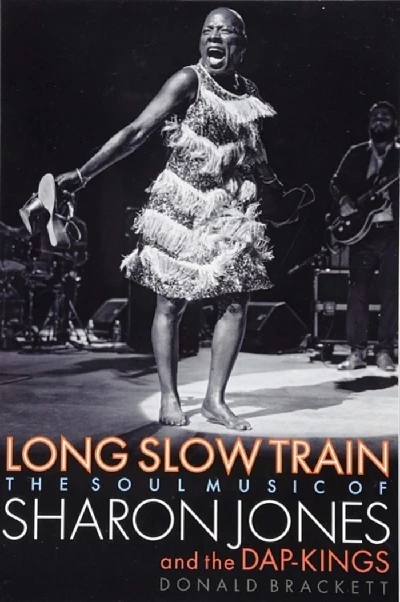Miscellaneous
-
Long Slow Train: The Soul Music of Sharon Jones and the Dap-Kings
published: 14 /
6 /
2019

Nicky Crewe examines a new book which explores the origins of soul music through the life story and career of Sharon Jones and her house band the Dap-Kings, and finds that the incredible success of Amy Winehouse was possibly at the expense of recognition that Sharon deserved before cancer took her.
Article
Sharon Jones (1956 – 2016) is now recognised as one of the great American soul singers. Donald Brackett, Vancouver based popular culture journalist, is obviously a fan. He has spoken to friends and family in researching this book. He gives us a timeline of her life, lists of concerts and a discography, biographies of the musicians she worked with at Daptone records and a history of that label. Part of this story involves the legend of Amy Whitehouse and Mark Ronson and their involvement with the Dap-Kings. This involvement almost certainly caused an interruption in the recognition and success of Sharon Jones.
She had worked and waited a long time for that recognition, paying her dues singing in wedding bands, working as a prison officer and the rest. Her own life took her through gospel roots to 60’s soul and into the 21st century through the enthusiasm of her fans and the support of Daptone founders Gabriel Roth and Neal Sugarman. With a label and studio committed to producing an analog and authentic sound, Sharon Jones and the house band were a perfect match.
There’s a quote I resist taking on board, because writing about music is something I love to do, but I was constantly reminded of it as I read this book. “Writing about music is like dancing about architecture.”
The book reads like a series of essays, articles or possibly talks. Brackett has a good turn of phrase. He’s a musicologist and he spends a lot of the book exploring background “from the root to the fruit of sou.”. But as a narrative about Sharon Jones the soul singer it doesn’t work for me. You learn more about her energy, determination, talent and courage in the face of adversity by looking at the cover photo, on stage, giving it all she’s got, completely bald from the cancer treatment she’s just undergone.
It’s a photo that tells us something about her life and her legacy. The cancer took her body but not her soul.
Barbara Popple made a documentary film about her, ‘Miss Sharon Jones’ released in 2015.She writes the Afterword, just a couple of pages, and her words provide more insight to the woman herself than any amount of detail about the record business and the repetition of the quote that she was considered “too short, too old, too fat and too black” to make it. Cruel words, hard times.
Speaking of which, I found myself reacting to the constant references to Sharon Jones’ height, weight and appearance. I don’t expect to read about a male artist described in these terms and for me sexist cliches have no place in a contemporary study. It’s one thing to quote others and I know we shouldn’t whitewash history. I’m about the same age as Sharon Jones and I’m very aware of the judgements made on women in the world of music and entertainment. Time to stop.
Of course, what the book did do was made me watch as much live footage of Sharon Jones as I could find and fervently wish I’d had the chance to see her. Result!